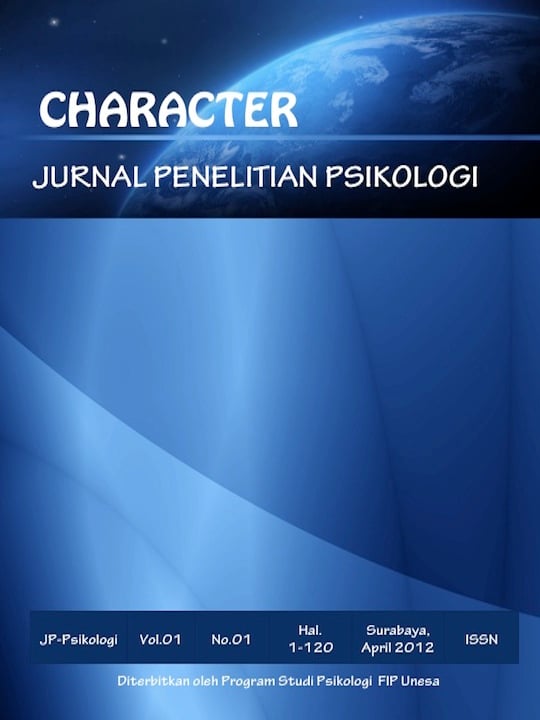Kesejahteraan Psikologis Ibu Tunggal Pasca Suami Meninggal Dunia (Studi Fenomenologi di Bali)
DOI:
https://doi.org/10.26740/cjpp.v9i1.45848Abstrak
Abstrak
Kehilangan pasangan akibat kematian akan membuat individu berada dalam fase kedukaan. Bagi perempuan yang memiliki anak dan suami meninggal dunia akan mengemban status sebagai ibu tunggal. Keragaman budaya dan adat di Bali mengakibatkan terdapat istilah bagi ibu tunggal yang berpisah dengan suami karena meninggal dunia yaitu perempuan balu. Menjadi perempuan balu bukanlah hal yang mudah terlebih di Bali menjunjung tinggi sistem patriakal. Ibu tunggal yang memilih untuk tidak menikah lagi dan tinggal bersama keluarga suami tentunya akan mengalami berbagai tantangan dan persoalan hidup. Hal ini sejalan dengan diharuskannya ibu tunggal di bali menjalankan awig-awig (aturan adat). Perubahan peran dan banyaknya aturan yang mengatur kehidupan ibu tunggal di Bali semasa melewati fase kedukaan akan memengaruhi kesejahteraan psikologis serta kualitas kehidupan. Oleh karena itu, penelitian ini bertujuan untuk mengetahui bagaimana gambaran kesejahteraan psikologis yang dimiliki oleh ibu tunggal di Bali. Penelitian ini merupakan penelitian kualitatif yang menggunakan pendekatan fenomenologi. Subjek dari penelitian ini adalah lima orang ibu tunggal di Bali yang tinggal dengan keluarga mendiang suami, serta bekerja sebagai pencari nafkah utama dalam keluarga. Teknik analisis data menggunakan metode interpretative phenomenological analysis (IPA). Hasil dari penelitian ini menunjukkan permasalahan yang dialami kelima orang ibu tunggal di Bali meliputi, penambahan peran sosial, permasalahan ekonomi, stigma negatif masyarakat, perasaan duka yang dialami ibu tunggal seperti kehilangan dan kesedihan. Selain itu, faktor penting yang mendukung kesejahteraan psikologis ibu tunggal di Bali yaitu adanya dukungan sosial, penerimaan diri, dan harapan hidup untuk melanjutkan keberlangsungan hidup.
Kata Kunci: Ibu Tunggal, Kesejahteraan Psikologis, Adat Bali.
Abstract
Losing a partner due to death will make the individual in a phase of grief. For women who have children and husbands who die, they will carry the status of single mothers. The diversity of culture and customs in Bali has resulted in a term for single mothers who separated from their husbands due to death, namely balu women. Being a balu woman is not easy, especially in Bali, which upholds the patriarchal system. Single mothers who choose not to remarry and live with their husbands' families will certainly experience various challenges and problems in life. This is in line with the requirement for single mothers in Bali to practice awig-awig (customary rules). Changes in roles and the many rules that govern the lives of single mothers in Bali during the grieving phase will affect psychological well-being and quality of life. Therefore, this study aims to determine how the description of the psychological well-being of single mothers in Bali. This research is a qualitative research that uses a phenomenological approach. The subjects of this study were five single mothers in Bali who lived with the family of their late husband, and worked as the main breadwinner in the family. The data analysis technique used the interpretative phenomenological analysis (IPA) method. The results of this study indicate that the problems experienced by the five single mothers in Bali include the addition of social roles, economic problems, negative community stigma, feelings of grief experienced by single mothers such as loss and sadness. In addition, important factors that support the psychological well-being of single mothers in Bali are social support, self-acceptance, and life expectancy to continue living.
Keywords: Single Mother, Psychological Well-Being, Balinese Culture.
Unduhan
Diterbitkan
Cara Mengutip
Terbitan
Bagian
Lisensi
Authors who publish in this journal agree to the following terms:
Copyright in any article is held by the author.
The author grants the journal, publication rights with the work simultaneously licensed under a Creative Commons Attribution License that allows others to share the work with an acknowledgment of the work's authorship and initial publication in this journal.
Authors may enter into separate, additional contractual arrangements for the non-exclusive distribution of the journal's published version of the work (e.g., posting it to an institutional repository or publishing it in a book), with an acknowledgment of its initial publication in this journal.
Authors are permitted and encouraged to post their work online (e.g., in an institutional repository or on their website) prior to and during the submission process, as this can lead to productive exchanges, as well as earlier and greater citation of published work.
 Abstract views: 531
Abstract views: 531





